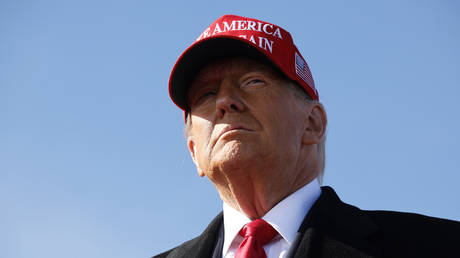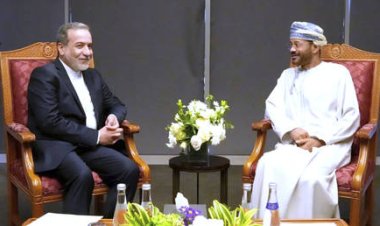Unveiling the Enigma of Donald Trump's Foreign Policy
Can the US president-elect restore his waning empire to greatness in a world that resists its dominance? Read the full article at RT.com.

The enigmatic nature of Donald Trump, the former US president and now president-elect, lies not in his personality or politics, but in the broader implications of his support. Many grieving American liberals ponder how Trump, “bombastic, profane, and frequently untruthful,” could garner substantial backing.
The answer to that question is straightforward: first, the Democrats have faltered remarkably in various aspects, from their handling of significant issues to an elitist disconnect with the electorate. Pre-election polls indicated that “a majority of Americans believed the US was on the wrong track,” a sentiment that clearly resonated with voters. Furthermore, it’s evident that large segments of the American populace see aspects of themselves in Trump; they reflect a culture that is obsessively individualistic yet deeply conformist, simultaneously anarchic and authoritarian, and often aggressively defensive yet sensitive to criticism.
In essence, the Democrats are perceived as outsiders for now, while Trump connects with his base, a dynamic that reveals more about the electorate than about his character. Understanding this requires a certain disillusionment.
However, a puzzling aspect of Trump is the lingering uncertainty about fully grasping who he is and what he represents, despite our familiarity with his previous term. American commentators hold polarized views regarding Trump’s predictability; while International Politics scholar Daniel Drezner asserts that foreign policy “is now clear,” historian Stephen Kotkin emphasizes that Trump remains “unpredictable.” This disparity highlights our ongoing speculation about Trump’s actions and intentions as he embarks on his second term.
Our interest in Trump’s choices for key positions in his administration is justified. Unlike his previous term, he now enters office with a robust popular mandate, having decisively won both the electoral and popular votes. Coupled with Republican control of Congress, Trump enjoys a “trifecta,” wielding significant power to shape the direction of not only the US but potentially global affairs.
Despite the overall decline of American power, Trump is positioned to emerge as one of the few leaders who can rightfully claim substantial authority on the world stage. Depending on his actions, he holds the capability to significantly influence global outcomes, for better or worse—though, historically, American power has often leaned towards destructive tendencies.
This context invites scrutiny of Trump’s selections for high office. His staff picks illustrate a mix of established neoconservatives like Marco Rubio, newcomers like TV personality Pete Hegseth for the Defense Department, and loyalists from his first administration, such as Stephen Miller. These choices provide insight into his potential approach to wielding his amplified power.
Trump is unlikely to challenge the oligarchical structures within the US; corporate interests will remain dominant. However, his relationship with the so-called deep state—including the FBI, judiciary, intelligence agencies, and military—has not been clearly defined. Appointments like Tulsi Gabbard for director of national intelligence and Matt Gaetz as attorney general suggest a desire for a firmer grip on these institutions, potentially indicating a readiness to assert robust control.
However, interpreting Trump’s appointments can only offer limited insights. During his first presidency, he faced constraints in aligning with traditional Republican forces, leading to selections that were often at odds with his own beliefs. General H.R. McMaster's recent revelations about Trump’s penchant for flattery and aversion to contradiction further illuminate the dynamics at play.
With the benefit of past experience, a stronger mandate, and a more devoted advisory circle, Trump is positioned to pursue his agenda more vigorously. His selections may be influenced in part by whether they align with his preferences, marking a distinct turn from previous tendencies.
Embedded within Trump’s slogan, “Make America Great Again,” lies a triad of assumptions: first, the acknowledgment that America’s current condition is unsatisfactory; second, the belief in a past greatness that should be restored; and third, the presumption that such restoration is feasible.
While the question of whether America has ever been “great” remains contentious, it provides crucial context. The historical suffering of Native Americans, the legacy of slavery, and the impact of America’s global actions demonstrate the complexities inherent in such declarations. Many Americans today live paycheck-to-paycheck, underscoring economic hardships that complicate notions of national greatness.
Exploring these questions challenges Trump’s worldview, which may obscure potential paths forward. Conceptualizing Trump as a late-Roman emperor at the helm of a diminishing empire, it’s essential to consider how he might pursue a return to an imagined glory. What does “Make America Great Again” portend, especially in terms of foreign policy? And conversely, which strategies are likely to contribute to failure?
Rather than dissecting familiar foreign policy issues, these inquiries necessitate a broader examination of how Trump’s administration will frame global challenges. The key question is whether he will cling to an outdated pursuit of global primacy, which is widely resented, or if he will learn to adapt to a new balance of power—a more multi-polar world in which the US plays a role among several significant actors. Adopting an understanding of multipolarity could enable a more pragmatic approach moving forward.
As the US inevitably descends from its “unipolar” phase, it still possesses resources to stabilize its status among leading global powers, provided its leaders acknowledge the unyielding currents of historical change. Conversely, an unwavering commitment to solitary supremacy will likely lead to increased geopolitical isolation and conflict.
In light of recent Foreign Affairs articles, the discussion surrounding American exceptionalism has resurfaced. Drezner asserts that the global perception of Trump signals a broader understanding of what America represents in the twenty-first century, while Caldwell and Smith advocate for a foreign policy shift that embraces restraint rather than overreach. Their perspectives suggest a recognition that America must recalibrate its approach to avoid repeating past errors.
The question arises whether this unconventional president could paradoxically lead America towards a more normalized role in the international arena. If Trump were to adopt a foreign policy emphasizing restraint and forgo aggressive military and economic posturing, he might manage the nation’s relative decline more gracefully. However, if recklessness persists, it risks polarizing the emerging multipolar landscape against the US.
The upcoming era presents the US with a pivotal choice: to seek a significant and perhaps prosperous role amid new world structures or to chase an elusive return to past supremacy, risking decline and potential collapse. Ultimately, that could be a transition worth considering.
Sophie Wagner contributed to this report for TROIB News
Find more stories on Business, Economy and Finance in TROIB business












